Feb 14, 2025 – Lecture at Jindal Global University and National Institute of Technology, Delhi 
Hello. Today, Sunim gave lectures at O.P. Jindal Global University and the National Institute of Technology in Delhi, India, before departing for Korea.

After completing his morning practice and meditation, Sunim packed his belongings and had breakfast. Mr. Lee Jong-bae, who runs the Sibang Bakery in Delhi, came to the accommodation to accompany and support Sunim throughout the day.

As it takes about two hours to reach Jindal Global University from the accommodation, Sunim left in a hurry. He departed at 7 AM and arrived at the university at 9 AM. Jindal Global University, established in 2009, is a private university in India. Although relatively new compared to top national institutions like the Indian Institutes of Technology (IIT) or Indian Institutes of Management (IIM), it has been making a name for itself in law and social sciences. The university is rapidly gaining recognition due to its active exchanges with prestigious foreign universities and its high-quality faculty.
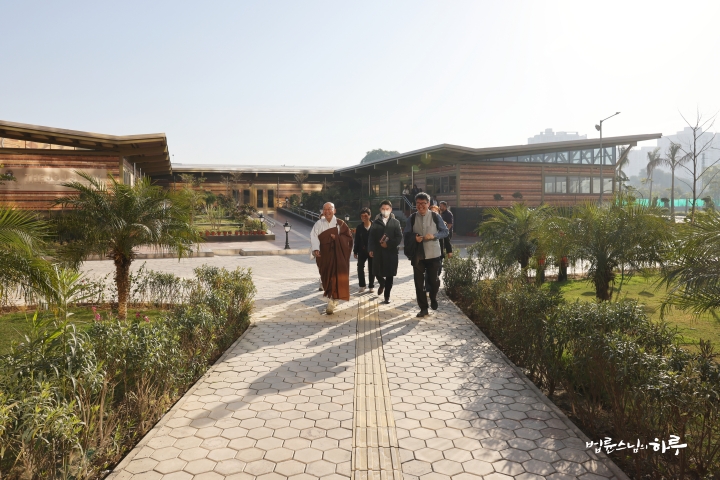
Before the lecture, from 9:20 AM, Sunim engaged in a conversation with about ten professors. They asked him questions about Buddhist solutions to various topics such as science, climate crisis, leadership, peace, and religion. Sunim answered the continuous stream of questions without hesitation. One of them asked how to connect Buddha’s teachings with inner peace.
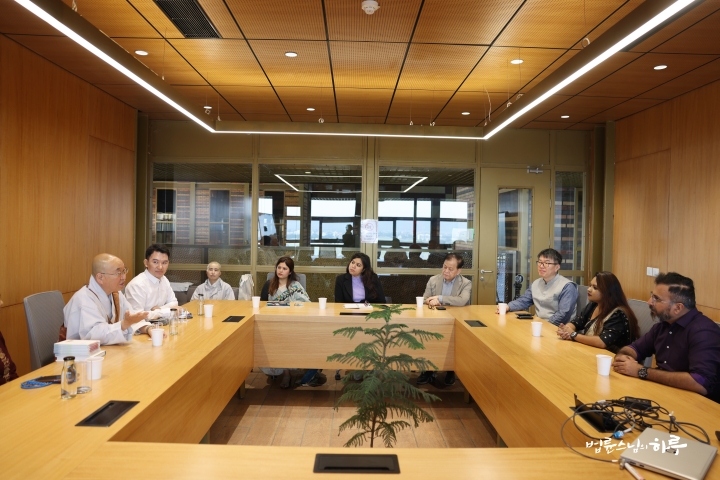
How Can Buddha’s Teachings Bring Inner Peace?
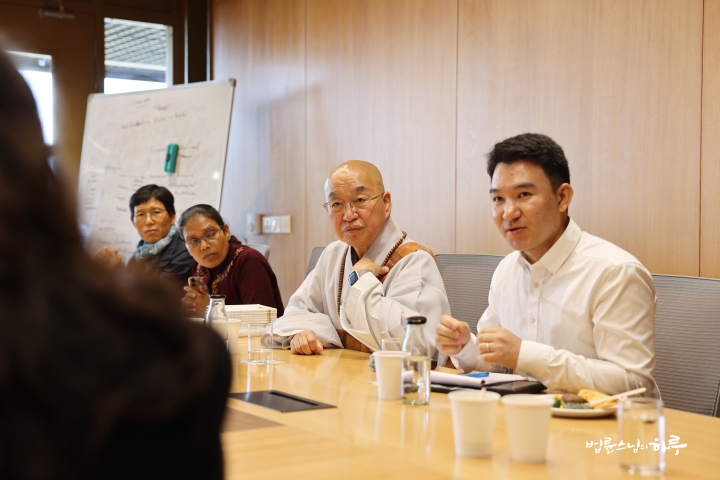
“Buddha’s teachings can be divided into three main categories. The first is observing precepts. This refers to a person’s outward character. It teaches us to speak and act with consideration for others. This corresponds to today’s ethics and morals. To live without suffering, we must at least refrain from violent behavior. Solving problems through force is not the right approach. These basic attitudes towards life are established as precepts.
Second is maintaining a calm mind. We often experience states of mind that are either elated or depressed. Our minds become agitated when we get angry or greedy, and we become depressed when things don’t go our way. Buddha’s teaching is about maintaining mental equilibrium, free from these emotional fluctuations.
Third is awakening from ignorance. In a state of ignorance, all kinds of psychological anxieties arise. For example, we become tense when meeting strangers or encountering new environments, and we feel uneasy in darkness. The reason we feel tense or anxious is because we don’t know well. When we don’t know the place, people, or situation, anxiety and fear arise. However, just as darkness disappears when we turn on the light, tension disappears when we understand clearly.
In summary, first, we must observe precepts; second, maintain mental equilibrium; and third, attain enlightenment. In Pali, these are called sila, samadhi, and panna respectively. We should practice according to these teachings.”
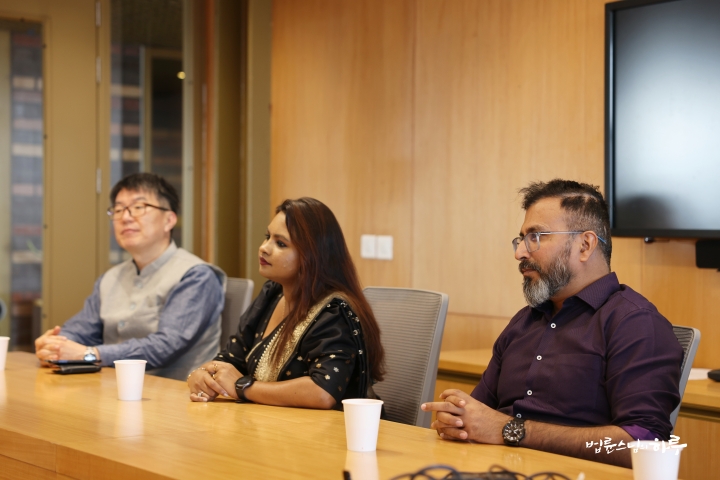
“Didn’t the Buddha say that this world is full of suffering? If people strive for respect, honor, or to become something, won’t they ultimately suffer? So, what perspective should we have between trying to become something and not becoming anything?”
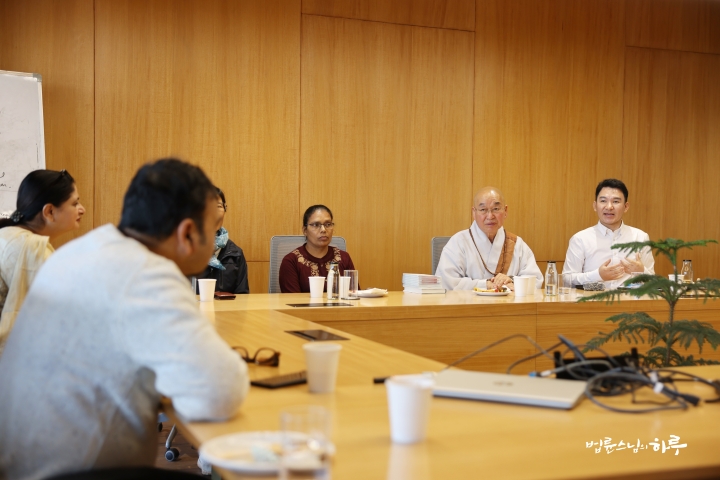
“The term ‘suffering’ can be confusing. In our minds, there are ‘desires’ that trigger actions. When these desires are fulfilled, we feel good, which we call happiness. Conversely, when they are not fulfilled, we feel bad, which we call unhappiness. However, in reality, our desires are sometimes fulfilled and sometimes not. We experience pleasure, then suffering, then pleasure again, and suffering again. This cycle repeats. This is samsara. In traditional Indian thought, samsara refers to the cycle of death and rebirth, but in Buddha’s teachings, it refers to the repetition of pleasure and suffering in life.
Pleasure does not last forever, so it eventually turns into suffering. Even pleasure can become suffering, so we must see through the fact that even pleasure is suffering. The repetition of pleasure and suffering is samsara, and this is suffering.
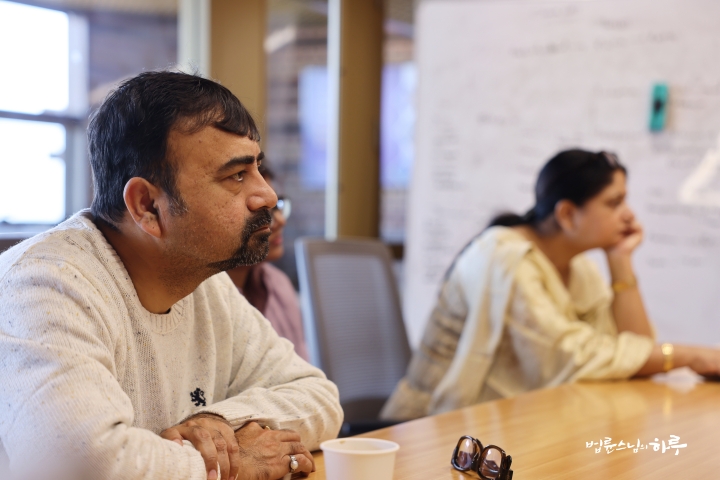
The suffering you mentioned is the opposite of pleasure, but the essential meaning is that pleasure eventually becomes suffering because it doesn’t last forever. When Buddha said life is suffering, he didn’t mean there’s no pleasure, but that pleasure and suffering repeat. Liberation means escaping this repetitive cycle. A state without suffering doesn’t just mean the absence of suffering, but also the disappearance of pleasure. The state where both suffering and pleasure have disappeared – that is the state of tranquility.”
“I know there’s a problem, but I don’t really know how to reduce stress practically. The teaching that we should remove the cause seems a bit difficult.”
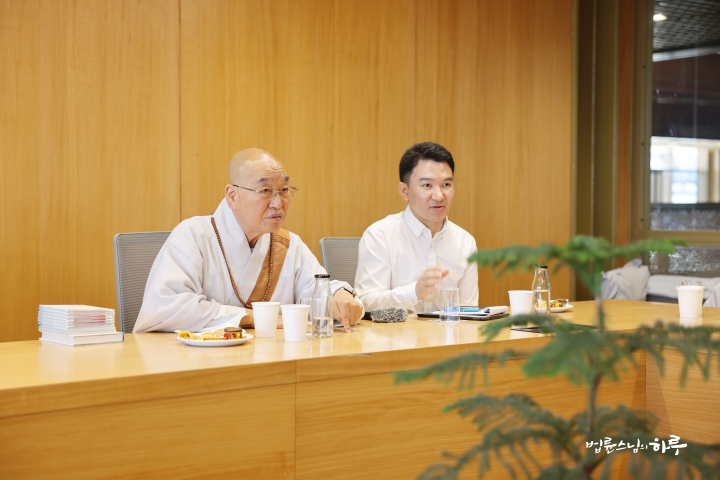
“I believe that such an approach is not helpful in solving problems. It’s simply a teaching method. Saying ‘Here’s a problem, try this’ doesn’t help students. What’s important is guiding students to find answers on their own. We need to help students realize for themselves, ‘Ah, I see.’ Professors inevitably have an attitude to teach, but I think that approach itself is fundamentally wrong. When we try to teach, students actually experience more stress. Through practice, students might not relieve stress but instead feel additional stress thinking, ‘Is it because I’m not practicing enough?’ It’s important to let students look at problems and find causes on their own.”
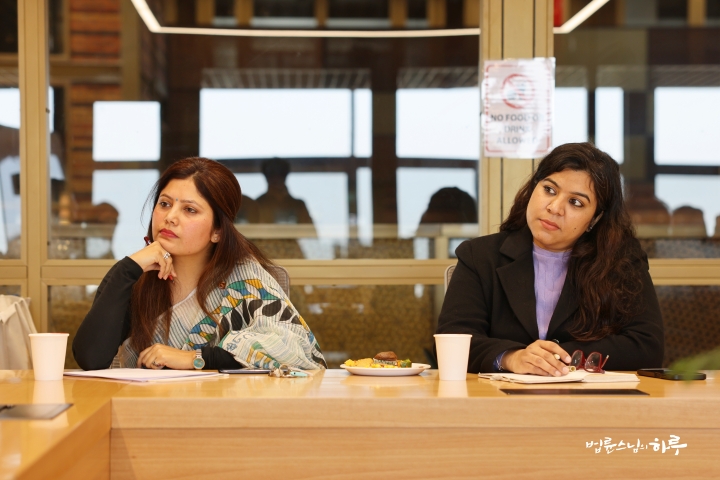
The professors listened attentively to Sunim’s responses with sincere expressions. After conversing with the professors for about 1 hour and 40 minutes, Sunim moved to the seminar room on the first floor. In the seminar room, about a hundred students were waiting for the lecture. After watching an introductory video about Sunim, the lecture began.
Sunim opened the conversation casually, telling the students that they could ask any questions about their current concerns. The students freely asked Sunim questions on various topics. The questions continued for about 1 hour and 20 minutes. When questions were asked in Hindi, Priyanka interpreted, and when questions were in English, Rinchen interpreted. One student sought Sunim’s advice on how to stop thinking, expressing distress over having too many complex thoughts.
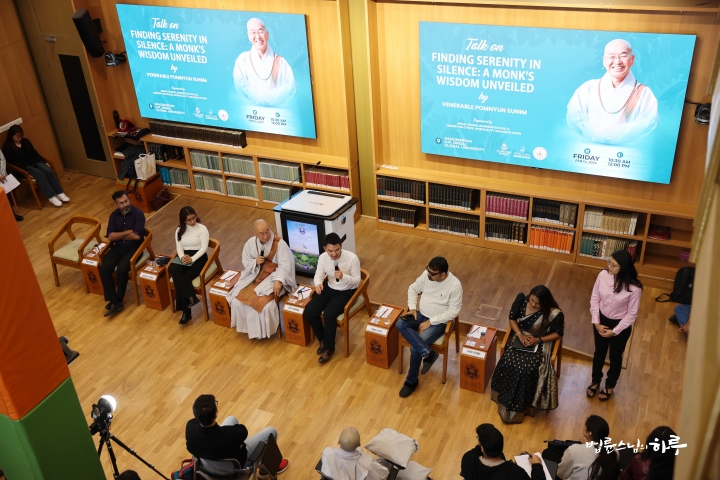
I’m Distressed Because My Thoughts Are Too Complex
“First, you need to let go of your thoughts. In other words, stop thinking.”
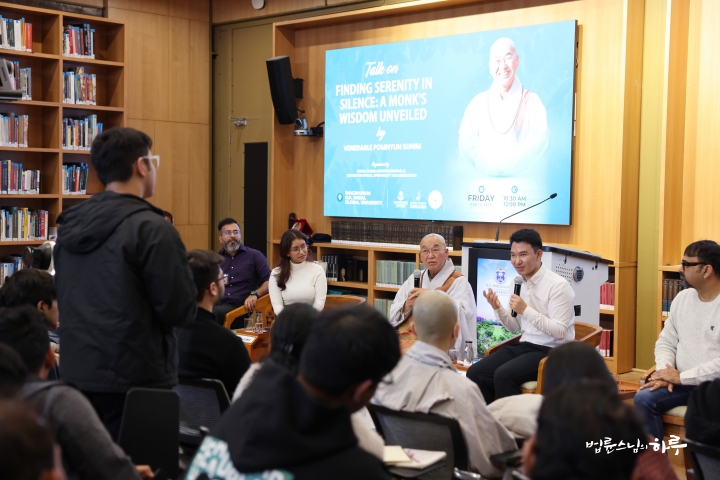
“But don’t thoughts arise automatically, regardless of our will?”
“Yes. In that case, just let them be. There’s no problem with that.”
“But my thoughts arise in a very complex manner.”
“Does that cause you distress? Or is it okay?”
“It’s distressing.”
“Is this distress created by you? Or is it caused by someone else?”
“I create it myself.”
“So, ultimately, you’re causing your own distress. Is this a wise action or a foolish one?”
“It’s a foolish action.”
“Then we should stop foolish actions, shouldn’t we?”
“I want to stop thinking, but thoughts arise unconsciously. How can I stop them?”
“Yes, that’s right. Thoughts are not easily stopped. In that case, just let them be. But you’re trying to stop them even while saying they can’t be stopped. That’s impossible, which is why you’re distressed. If they stop, let them stop. If they don’t, just let them be.”
“But if I just let them be, my thoughts become even more complex.”
“Then accept the distress. After all, you’re causing your own suffering. You can continue to live foolishly if you want, but you’re the only one who loses by doing so.”
“How can I stop my thoughts?”
“You’re distressed because you’re trying to forcibly stop something that can’t be stopped. The problem isn’t that thoughts keep arising, but that you’re trying to stop them. When you can’t stop them, as a temporary measure, you can divert your attention elsewhere, like changing TV channels. You can go outside and run, watch a movie, or do other activities.”
“But I don’t want to have such complex thoughts at all. I can stop thinking momentarily, but it keeps repeating.”
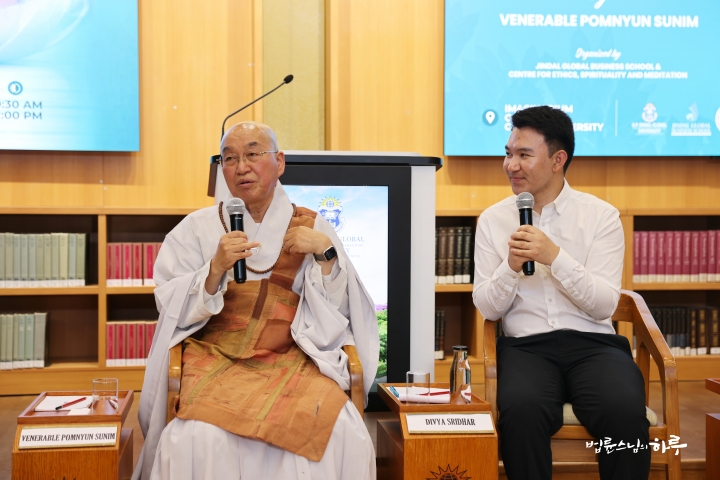
“When you say you want to stop thinking, that ‘want’ is desire. It’s the same as saying ‘I want to make a lot of money’ or ‘I want to do well on the exam.’ We view some things positively and others negatively, and we have desires. The common point is that we want to do something.
However, we can’t achieve everything we want. If something can’t be achieved, one option is to give up. So if you want to stop thinking, first try to stop. If that doesn’t work, try diverting your attention elsewhere, like changing TV channels. This is how you can initially solve your problem.
But to solve it fundamentally, you need practice. This is what ‘meditation’ is. When meditating, no matter what thoughts arise, you don’t pay attention to them and only focus on your breath at the tip of your nose. If you meditate consistently, even if thoughts don’t completely disappear, your attention will be focused on your nose tip, and you’ll forget what thoughts are arising. To fundamentally solve your problem, practice meditation consistently.
You usually want easy answers. But there’s no such thing. The easiest method is to just let things be. When a problem arises, one way is to investigate the cause and solve it, and another way is to not make it a problem. Not making it a problem is ‘intuition.’ It’s solving the problem intuitively in one go. Finding the cause and solving it takes time and practice, but if you don’t see the problem as a problem, it disappears by itself. What I’m telling you in our conversation is this ‘method of not making it a problem.’ Is it difficult? But this is the easiest way.
Right now, you have no problems. Did you break up with your partner? Then you can meet someone new. Do your parents oppose your marriage? Parents can oppose. If you think they’re right, you can break up, and if you still want to marry, you can. You’re all adults, so you have the right to make your own decisions. It’s okay if conflicts arise with your parents. If you want to marry someone you love, you should be able to pay that price. Some people even give their lives for their lovers, right?
Did you fail an exam? That’s okay. Let’s take the driving test as an example. If you failed, it’s because your skills were lacking. If you went on the road with those skills, the chances of an accident would be high. So failing is a good thing. You can practice more and try again, and if you fail again, you can practice more. You need to build up your skills sufficiently to drive safely, and that’s how you can protect yourself by reducing accidents. No god is involved in the driving test.
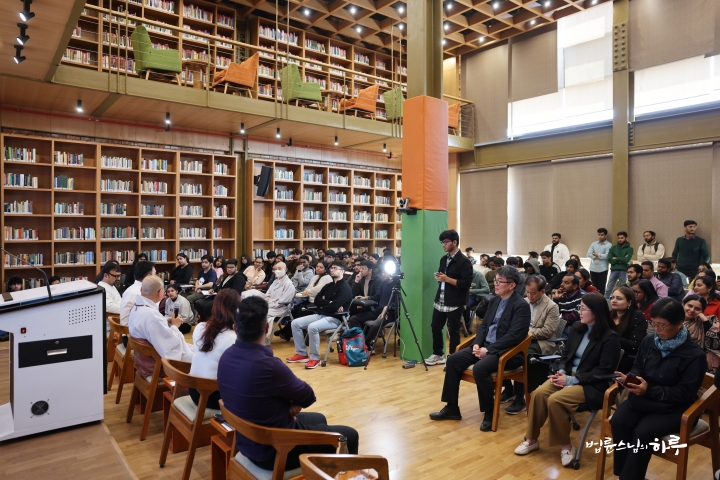
If you think about it carefully, there’s actually no problem at all. Always maintain this perspective in life. Of course, if you lack drinking water or food, that’s a bit of a problem. In such cases, support should be provided. But you don’t have such problems. When you stop thinking, there’s no problem at all. The only issue is that you can’t stop. However, if you live with the perspective that ‘there’s no problem,’ even that issue will resolve itself naturally.
None of you have any problems. So live happily. Being in an environment where you can study is a good thing. There are many people in the world who want to study but can’t. So just being able to study here and now is a happy thing. It’s not like you can come to this school just by studying well, right? You would have needed your parents’ support. Having such parents is also a good thing. I hope you live thinking about these good aspects that you have.”
The questions continued to come.
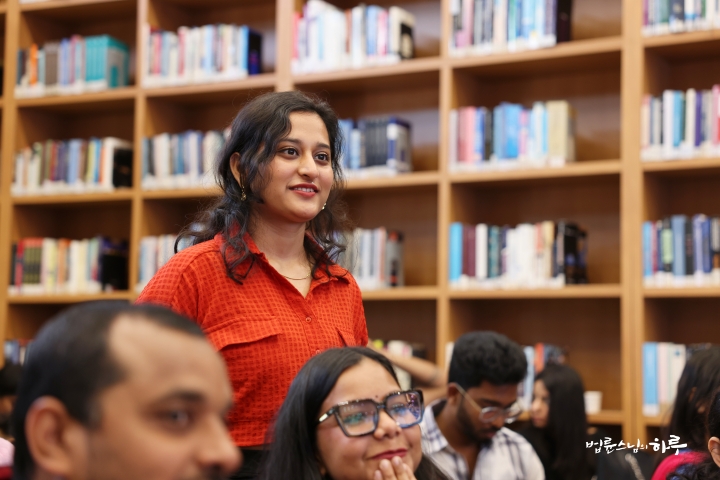
The lecture went on about 30 minutes longer than expected. As the next schedule, a lecture at the Indian Institute of Technology, was planned for 1 PM, we had to regrettably conclude the lecture.
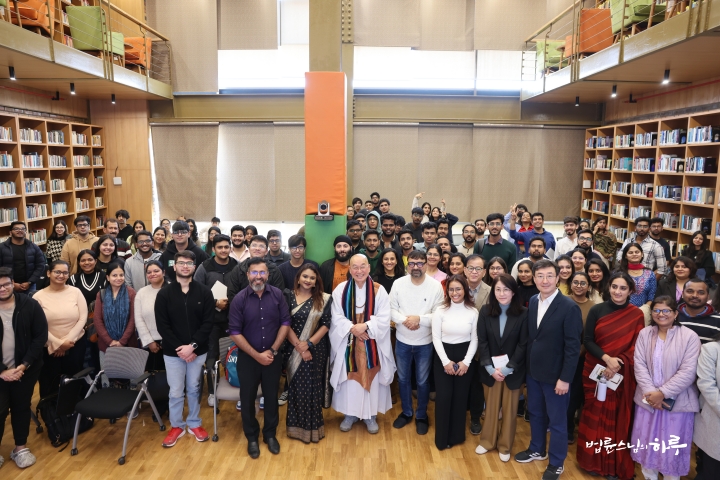
After taking a group photo together, we hurriedly departed. We had lunch with kimbap in the car and arrived at the lecture hall around 1:15 PM.

Before the lecture began, Sunim had a brief conversation with the professors. Several professors, including one who had actively asked questions to Sunim last year, warmly welcomed him.
At 1:30 PM, Sunim immediately moved to the lecture hall. About 70 students were waiting for the lecture. Sunim briefly explained the purpose of the Dharma Q&A and then immediately started taking questions. Anyone could raise their hand and ask Sunim a question. Over the course of two hours, ten students engaged in dialogue with Sunim.
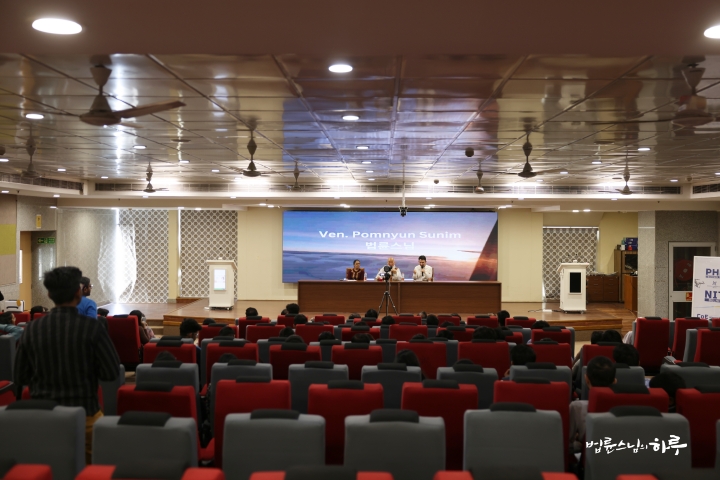
The first questioner asked Sunim for advice on what to do first to escape from suffering when it becomes too overwhelming.
What Should I Do First When My Mind Is in Great Distress?
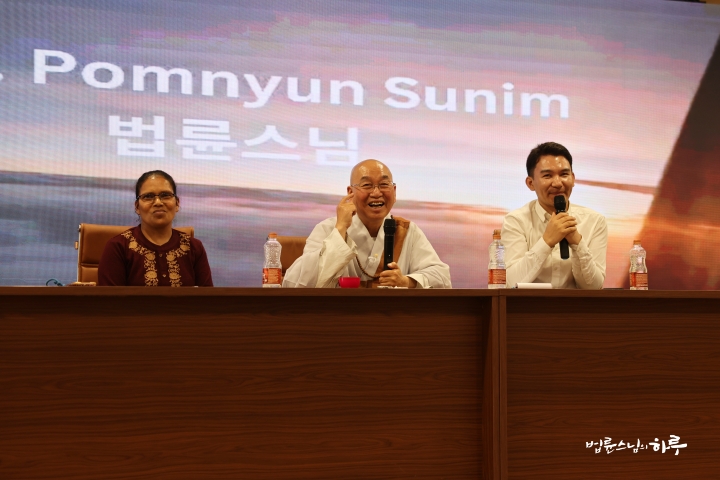
“First, write down the types of suffering in a notebook. Then ask yourself, ‘Why is this causing me suffering?’ At first, it may feel painful, but when you examine it specifically, you might think, ‘This isn’t necessarily a painful thing, is it?’ In such cases, you can just erase it.
For example, let’s say you broke up with your boyfriend. But why is that causing suffering? Originally, you were alone, and then you met your boyfriend and it was good for a while. Even if you break up, you’re just returning to your original state. Of course, it might be a bit regrettable, but it’s not necessarily something to suffer over. Also, we need to break up to meet new people. In today’s world, there’s no rule that says we have to be with one person until we die. If I left that person, I might be criticized, but if he left, it’s not my fault. Rather, because he left, I can meet someone else, so this can’t necessarily be called a bad thing.
If you look at each situation specifically like this, you’ll come to think, ‘Ah, this isn’t something to suffer over?’ Then it’s no longer a problem. There are no set answers in life. Whether you set goals or establish standards like ‘This is how I should live,’ these are all self-created, and there are no predetermined answers.
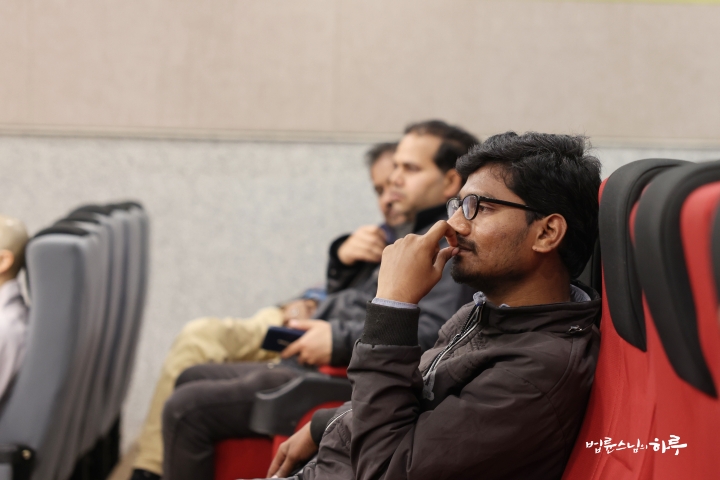
If you look closely, you’ll find contradictions in your life. There are instances where you make choices that seem good, but you feel the results become negative. Marriage might bring joy at first, but can later become a source of suffering. You may receive congratulations from everyone when getting married, but end up experiencing pain. Having children can bring happiness, but later they might become a cause of distress. Opening a store might fill you with excitement, but running it can become burdensome. Even you, when you entered this school, were happy, but now you find studying difficult. This is a contradiction. Why does this happen? Why do good things turn into bad experiences? By examining this, we can understand why we suffer. Exploring these questions is what Buddhism is about.
Scientists explore matter, doctors investigate our bodies, and practitioners examine our minds. Doctors treat sick people, while practitioners heal troubled minds to reach a state free from suffering. In this sense, practitioners are like scientists from the perspective of exploration. The difference is that their object of study is mental processes. Of course, psychiatrists also study mental processes. However, psychiatrists examine others’ minds, while practitioners investigate their own. Thus, practitioners can reach a state free from suffering themselves. In contrast, psychiatrists, studying others’ minds, may not overcome their own suffering. Therefore, you too should explore your own mind. This has nothing to do with whether you become a monk or not.
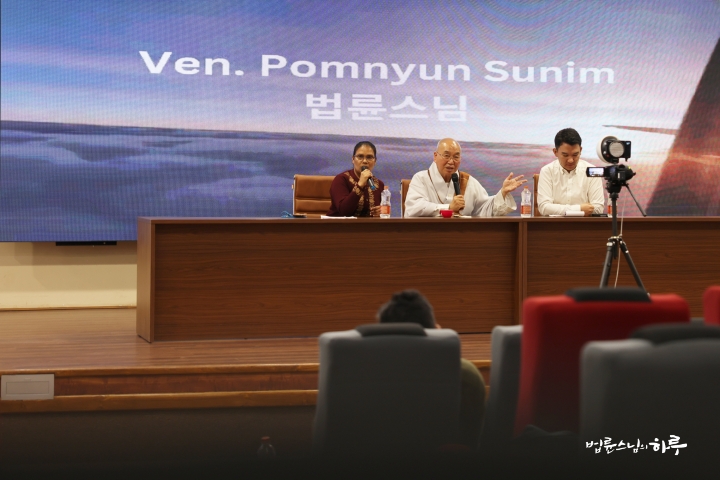
Even during the Buddha’s time, there were already two paths available. One was to renounce everything and become a monastic practitioner, and the other was to practice while remaining a layperson. Originally, Buddhism did not have the concept of a “believer.” However, as Buddhism transformed into a religion, monastic practitioners took on the role of priests, becoming figures who prayed for blessings, while lay practitioners became believers seeking blessings. This made Buddhism indistinguishable from other religions, but this was not Buddhism originally was. Originally, Buddhism did not talk about receiving blessings through prayer or about the afterlife. Buddhism teaches how to live without suffering by exploring one’s own mind.
Therefore, Buddhism is necessary for everyone. It doesn’t matter what religion you believe in. Whatever you believe, it is your freedome. However, if you want to be happy, you need to study the Buddha’s teachings on exploring the principles of the mind. I hope you won’t approach Buddhism only from a religious perspective.
“Yes, thank you.”
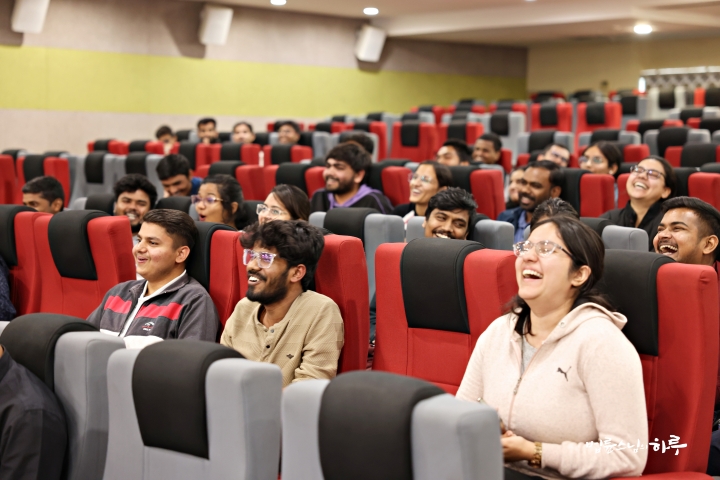
The questions continued to come.
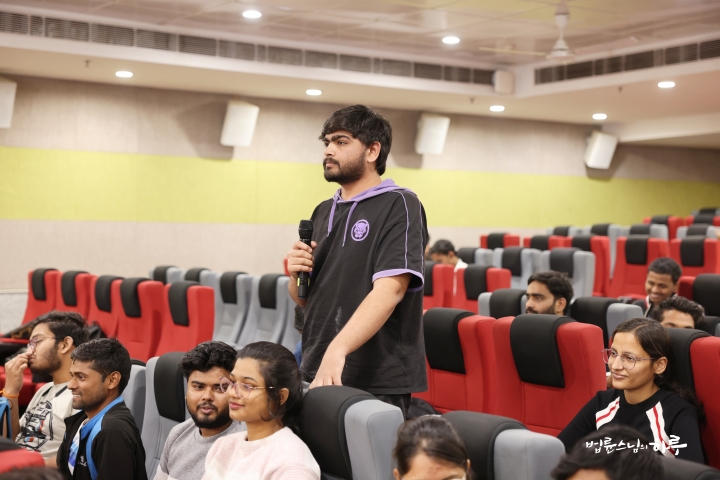
As this was the second lecture following last year’s, the students of the Indian Institute of Technology seemed familiar with the Dharma Q&A format. They shared their concerns more comfortably and actively, and as time passed, more students wanted to ask questions. However, Sunim had to wrap up the lecture as he needed to move to the airport soon.
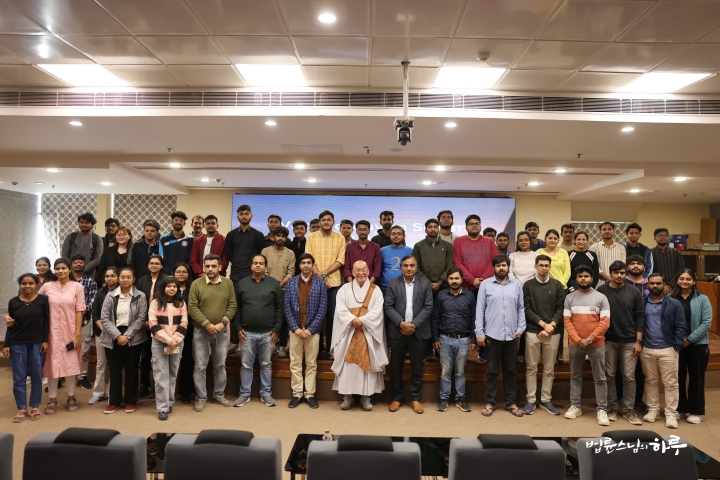
After the lecture, when Sunim returned from the restroom, a student was waiting for him in front of it.
“Sunim, I’m attending a good school and don’t have any particular problems, but I always feel empty. I feel like something is missing and that I should be doing more.”
“Then can you leave with me right now?”
“If I didn’t have a family, I think I could go with you, but it’s difficult because I have a family.”
“That’s an excuse. If you’re vaguely worrying about various things without having a clear goal, it’s most important to focus on what you’re doing now. You need to live with a strong sense of self.”
Though it was a brief exchange, the student’s expression brightened considerably.
“Thank you!”
After the lecture, the professors were waiting to see Sunim off. Sunim presented books to the professors and expressed his gratitude.
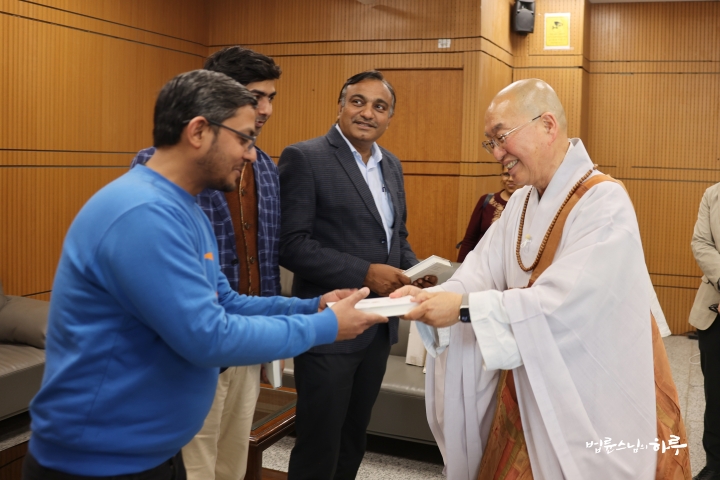
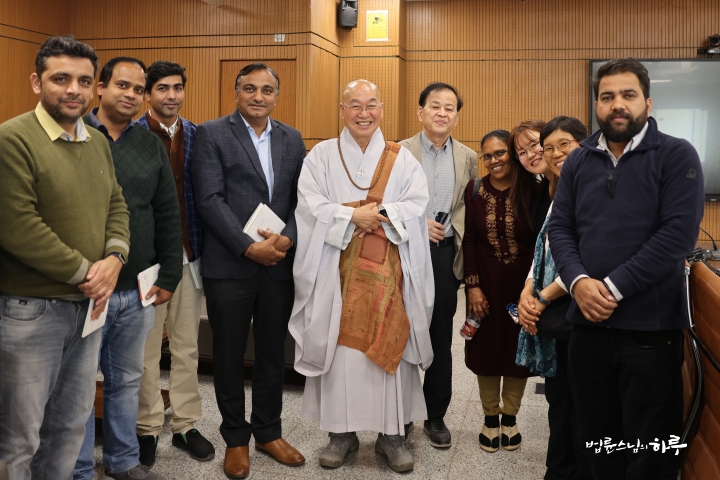
He also greeted Kang Hyejung, who had prepared for this lecture.
“I heard you came all the way from Korea to India specifically to prepare for this lecture. Thank you.”
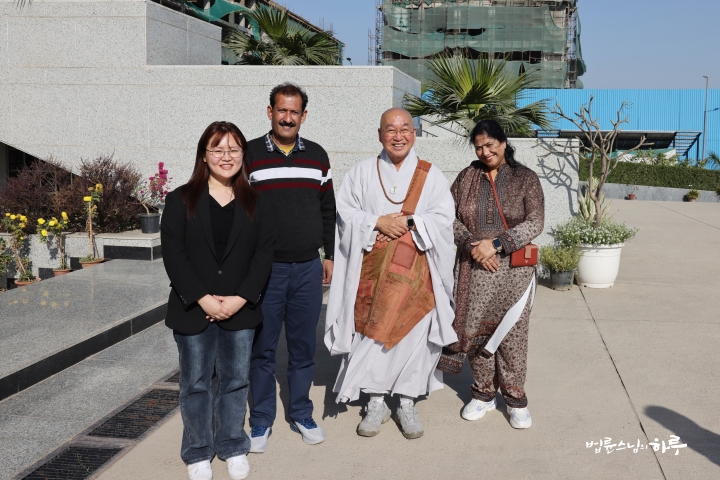
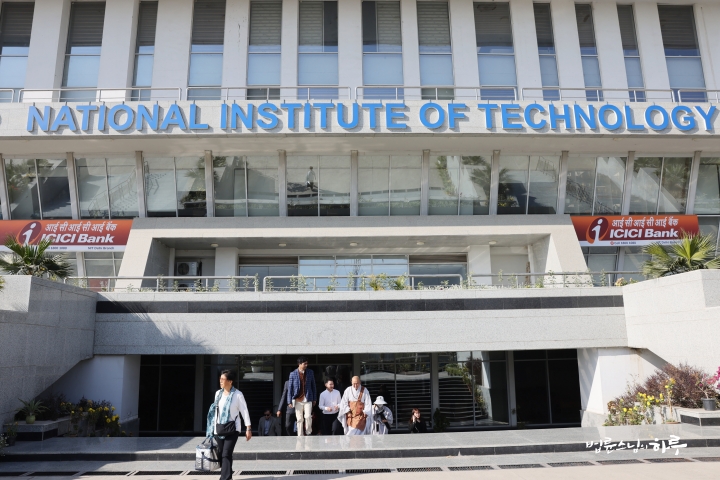
Arriving at the airport at 5:10 PM, Sunim also bid farewell to Bogwang Dharma Teacher and Priyanka, who had supported the entire India itinerary. The group had different flight departure times. After checking each person’s check-in start time, Sunim carefully ensured that everyone could pass through the departure gate together.
The group, expecting to part at the airport entrance, unexpectedly passed through the departure gate together and had a brief conversation. Rinchen smiled and said:
“I thought we’d say goodbye to Sunim at the airport entrance because of our different flight times, but it’s nice that we can wrap up together like this.”
“Yes, I’ll go in now. If I go in late, it will delay your dinner time. Enjoy your dinner.”
After saying goodbye to the remaining group, Sunim headed to the boarding gate. Due to a flight delay, the plane took off just after 8 PM.

With this, the 54-day schedule that began on December 23rd last year has concluded, and Sunim is expected to arrive at Incheon Airport tomorrow.




